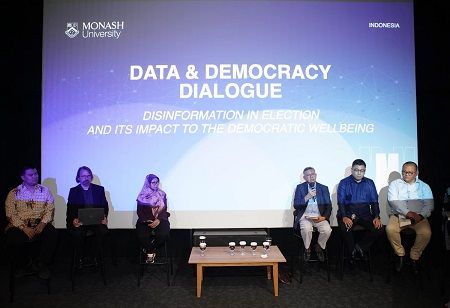In the digital era, democracy faces unprecedented opportunities and challenges. While digital technologies have the potential to empower citizens, enhance transparency, and facilitate public participation, they also bring risks such as misinformation, technology misuse, and the erosion of public trust in democratic institutions. Data & Democracy Dialogue, an engaging public discussion by Monash Data & Democracy Research Hub (MDDRH), was conceived to address these pressing issues, focusing on the transformative role of data in building resilient digital democracy, with a special emphasis on the ASEAN region.
Held at Kineforum, Taman Ismail Marzuki, Data and Democracy Dialogue brought together esteemed lecturers and expert speakers to engage in vital discussions on the evolving relationship between data and democracy. This dynamic dialogue focused on advancing digital literacy, strengthening democratic practices, and shaping impactful policy frameworks to navigate the complexities of governance in the digital age. With a diverse range of perspectives, the dialogue addressed key issues surrounding the theme of 'Information Disorder during Election Period', offering actionable insights to guide future developments in digital democracy.
In her opening remarks, Associate Professor Ika Idris, Co-Director Monash Data & Democracy Research Hub, highlighted the relevance of data in capturing information disorder during election times. She revealed that between September 2023 and March 2024, there were 1.5 million instances of hate speech related to the general election in Indonesia. She emphasized that data can reveal important realities, such as the shifting nature of hate speech, the role of social aid in elections, the orchestration of hate, and the influence of geopolitical tensions. She concluded by calling for collaboration to focus on future actions that will harness data to strengthen democratic resilience in the digital age.
MDDRH as part of Monash University, invites collaboration with stakeholders, including Civil Society Organizations (CSOs), think tanks, NGOs, researchers, policymakers, activists, critics, and university partners to work together in advancing digital democracy and strengthening democratic resilience in the future. With a global presence spanning over 100 partner universities across regions including Prato (Italy), Mumbai (India), Jakarta (Indonesia), Suzhou (China), Kuala Lumpur (Malaysia), and Melbourne (Australia), Monash University is uniquely positioned to facilitate meaningful partnerships and offer extensive opportunities for international cooperation. As highlighted by Prof. Jane M. Jacobs, Director of Academic Affairs of Monash University, Indonesia, these collaborations are key to creating meaningful, global solutions and driving positive change in the current digital age.
The event commenced with the presentation of 'Disinformation Index', a pioneering regional tool developed to address critical gaps in global indices. This tool specifically analyzes the impact of disinformation on democracy in ASEAN nations. The growing menace of disinformation in elections has become a pressing issue, where the deliberate use of false information to mislead, deceive, or confuse voters undermines democratic processes. In recent years, particularly in ASEAN countries, elections have seen a surge in disinformation campaigns aimed at manipulating voter perceptions and influencing outcomes.
The presentation was delivered under the title "Disinformation in Election and its Impact to the Democratic Wellbeing" by esteemed lecturers from Monash University, who collaborated on this vital research for the region, focusing on areas such as electoral integrity, political participation, and civil liberties. Their insights were further explored by a panel of expert speakers who provided valuable perspectives on how disinformation is reshaping political landscapes, particularly in the context of elections. The discussion was expertly moderated by Yuliasri Perdani (Collaboration Director of Project Multatuli). The panel offered a deep dive into the complexities of disinformation, highlighting its implications for democratic processes and electoral integrity.

